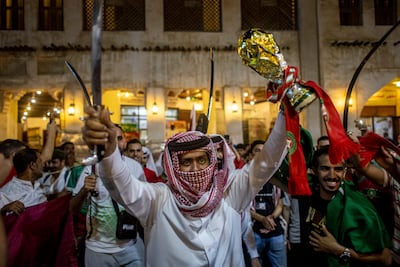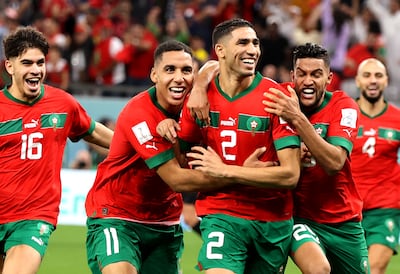Brazil vs Argentina, Germany vs the Netherlands, England vs Scotland — football’s biggest rivalries are defined by a fierce passion at a level usually reserved for warring nations.
International football’s most intense rivalries are often those between countries sharing a continent or even a border, meaning more matches and more fuel to stoke the fires of competition.
In the Middle East, however, the World Cup in Qatar has united supporters of teams from the region, with Arab fans passionately rooting for neighbouring countries in matches against the footballing elite.
And with Morocco's historic knockout victory over Spain on Tuesday, the Arab world has a single team remaining in its first World Cup as host, with fans packing cafes, restaurants and homes in Cairo, Beirut, Tunis and Jeddah to cheer for their new heroes.
“We love Morocco and them winning gives us a reason to celebrate,” Mahmoud Abdullah, a Saudi resident in Jeddah, told The National. “Saudis share a special relationship with all their neighbours and Arabs around the world. We wish them the best and hope they go on to win.”
Syrian Habiba Arif, who lives in Jeddah, said: “I am so proud of Morocco and the way they played. Arabs are happy to have one of their own teams win, it's who we are and always have been — celebrating our brothers. This sentiment is shared by Arabs around the world, even those who live far away from home.”

For Casablanca-based Tunisian Ghada, 30, cheering for Morocco against Spain was never in question.
“Of course, I feel very happy for their win yesterday. I have been living here for the past six years and have family here,” she told The National.
Ghada, who is married to a Moroccan and has two sons, said she would have been happier if the Tunisian team had made it through, but she said every Arab or African win counts for her.
“I believe that the entire Arab world and African continent is standing with Morocco, especially because the World Cup this year is hosted by an Arab nation,” she said. “We’ll always be brothers and it is our duty to stand with each other.”
Noureddine Ahmed, a 30-year-old Tunisian photojournalist, said: “Morocco is the last standing Arab country in the World Cup and, knowing the Spanish colonial history there, we can only stand with them.”
Morocco's star player Achraf Hakimi, scorer of the winning penalty against Spain with a cheeky chip, has made headlines around the Arab world after rising from a modest upbringing.
“The fact that he came from a poor immigrants’ family and had a mother that made lots of sacrifices for him to be where he is today as a professional football player conveys in us a sense of belonging, as we all come from the same background and people [like Hakimi] are similar to us,” Ahmed said.
Moroccan expats across the region were made to feel like they were back home, given the strength of support from fans in their adopted countries.
“I am so happy my team won. My children and I were singing and dancing with joy last night,” said Amira Hamdan, a Moroccan resident in Jeddah. “I hope we win the World Cup, even though the happiness I felt was more than enough.”
Iraqi football fan Saif Al Dabbagh, 29, an IT worker who lives in Baghdad, told The National: “There are people supporting Argentina due to their love of [Lionel] Messi, others are with France because they are the best [team remaining] now.
“[But now] all Arabs and Iraqis are supporting Morocco, [which is] now in first place for support.”

Cheers were heard from the streets of Lebanon's capital Beirut, with residents honking car horns when the final whistle was blown on Tuesday.
For a moment, football seemed to reconcile a divided country.
“They are the pride of all Arabs. I’m happy that an Arab country made it that far. No one expected that”, Lebanese resident Mayssa Yaghi, 28, told The National.
Fatma Halal, 45, called it “a historic win”. She said: “It is impossible not to be happy, we are really proud. Inshallah they make it to the end now.”
“We can hold our head up high today — it is like Lebanon has won,” said Beirut resident Lina Olleik.
Lebanese fans expressed their joy on Twitter over what they consider an Arab victory.
The image of Morocco's team — dubbed the “Atlas Lions” — raising a Palestinian flag during their celebrations went viral on Lebanese social media, with some seeing it as a sign that people of the Arab world are still standing with Palestine, regardless of their government's position.
Lebanese leaders also showered the Moroccan team with praise.
“We congratulate the Moroccan team for qualifying for the quarter-finals of the World Cup. Congratulations and wish you the final victory,” caretaker Prime Minister Najib Mikati wrote on Twitter.
“We are all Morocco, congratulations”, former prime minister Saad Hariri tweeted.
“When the team actually won there wasn’t a dry eye in the room,” said Egyptian Karim Ahmed, 34, from Cairo.
“I was so happy and proud. Of course I was. I really did not think I was inclined to pan-Arabism, but the emotions were very difficult to control. I didn’t know where they were coming from. The team did play really well though, they deserve to make it through.”
Ahmed Salah, 32, also from Cairo, said: “It is undoubtedly an achievement. Amid all the cheering yesterday I was suddenly aware that I was witnessing history. I saw the first Arab national team qualify for the quarter-finals of the World Cup and I will remember that day forever.”
With reporting by Ghaya Ben Mbarek in Tunis, Mariam Nihal in Jeddah, Robert Tollast in Abu Dhabi, Nada Maucourant Atallah in Beirut and Kamal Tabikha in Cairo









